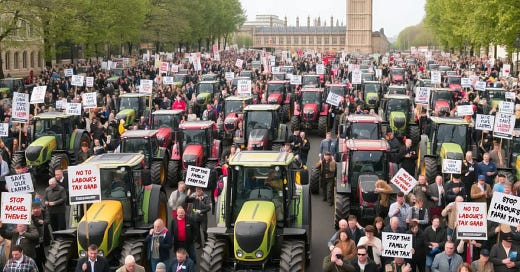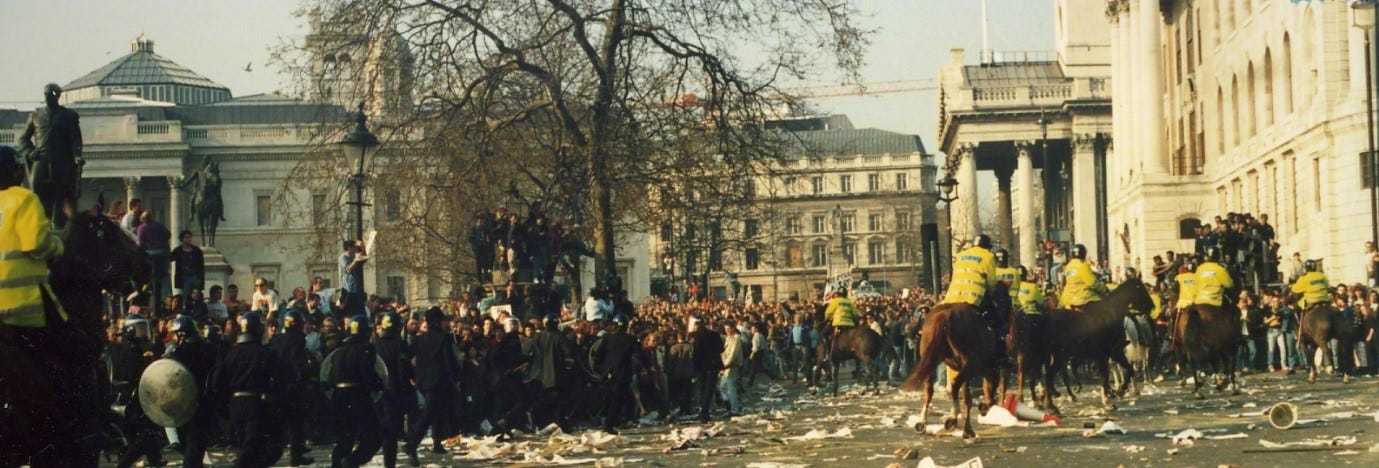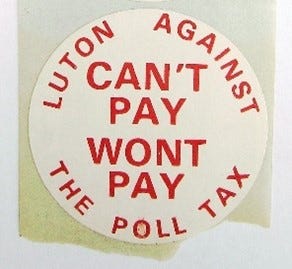Will the farmers' protest on 19th November 2024 be yet another demonstration that achieves little and brings no meaningful change?
Regrettably, the likely answer is yes. However, hope lies in gaining a clear understanding of the system driving this agenda.
When the government announced the inheritance tax policy in the November budget, they would have already anticipated backlash and protests, factoring these into their plans. They are adept at managing dissent, whether by infiltrating protests to discredit them or steering them into ineffectiveness through false leadership. A brief review of historical protest movements reveals this pattern.
The government also exerts significant influence over the media, including so-called 'controlled opposition' outlets. Take care with sources like GB News, which are unlikely to reveal the deeper origins of this policy and distract people with semantics.
What are the real origins of this policy?
Firstly, farmers need to understand the true purpose behind this policy, alongside the rising costs of red diesel and fertiliser and the tightening grip of oppressive regulations. It’s not about the revenue generated which is an insignificant sum in the overall context of government spending. Instead, this is a very deliberate strategy to drive small, independent farmers out of business.
Secondly, Farmers need to fully understand the system which has brought about this sinister policy and where it has come from; 405E 45th St, New York, NY 10017, USA, better known as the United Nations headquarters. Here’s a sobering reality: we no longer live in a democracy. The rules they operate by are not the rules we once knew, and they’ve conveniently rewritten the laws to enable their agenda.
Just days before the government announced its punitive inheritance theft on family farms, a measure likely to force the breakup of farms that have taken generations to build, the Climate Change Committee piled on further insult. It advised the government that the UK must cut meat and dairy consumption by 50% to meet Net Zero targets. Thanks to the Climate Change Act 2008, these recommendations, made by unelected globalist change agents, are legally binding.
So much for democracy. This is communitarian governance in plain sight. And as for the so-called consensus on Net Zero? We’ve all agreed don’t you know!
Obviously, Starmer is a vacuous shell of a person and a clear wrong-un. However, he and Reeves are merely ‘useful idiots,’ executing the UN’s Agenda 2030. This is the foundation of the communitarian governance system, which I’ve explored in greater detail in my article, Communitarianism for the Distracted.
The UK is fully committed to achieving the 17 Sustainable Development Goals outlined in Agenda 2030. The ones most relevant here are:
SDG 2 – Zero Hunger
SDG 15 – Life on Land
SDG 17 – Partnerships for the Goals
This collectivist agenda views small, independent farmers as obstacles to sustainable development. The preference is for agriculture to be centralised and controlled by a few favoured Big Ag corporations.
As Henry Kissinger famously said: “Control the food, and you control the people.”
Former Labour advisor and globalist agenda pusher, John McTernan, let the cat out of the bag by stating the real goal in a recent TV interview: “If the farmers want to go on the streets - we can do to them what Margaret Thatcher did to the miners.” He added: “It’s an industry we can do without. If people are so upset that they want to go on the streets and spread slurry then we don’t need small farmers.”
Sustainable Development is underpinned by the logical fallacy of the anthropogenic global warming theory. Far from being a genuine environmental initiative, it is, at its core, a political agenda, and even its proponents admit as much:
“It doesn’t matter what is true, it only matters what people believe is true.” – Paul Watson, Founding Director of Greenpeace.
“One must say clearly that we redistribute de facto the world’s wealth by climate policy. One has to free oneself from the illusion that international climate policy is environmental policy. This has almost nothing to do with environmental policy anymore.” – Ottmar Edenhofer, IPCC panellist and Director of the Mercator Research Institute, in a 2010 interview with NZZ Online.
“The data doesn’t matter. We’re not basing our recommendations on the data. We’re basing them on the climate models.” – Professor Chris Folland, Hadley Centre for Climate Prediction and Research
“The models are convenient fictions that provide something very useful.” – Dr David Frame, climate modeller, Oxford University
“We’ve got to ride this global warming issue. Even if the theory of global warming is wrong, we will be doing the right thing in terms of economic and environmental policy.” – Timothy Wirth, President of the UN Foundation
And then, perhaps most tellingly:
“You’ll own nothing and be happy.” – Klaus Schwab, Executive Chairman of the World Economic Forum, a key strategic partner of the United Nations
These statements clearly expose the underlying motives behind the agenda: centralised global control and the concentration of wealth and assets for the elites.
Psychological Steering
The government’s Behavioural Insights Team is well aware that farmers are honest, hardworking, and honourable people, everything they themselves are not. Generally, farmers simply wish to be left in peace to work the land, earn a living, and pass their way of life down to their children. Yet history shows that collectivist regimes despise farmers, precisely because their self-sufficiency makes them difficult to control.
The government will undoubtedly frame any dissent as unreasonable and exploit farmers’ good nature against them, weaponising the public sector in the process. The general public will also be manipulated, persuaded to see farmers as greedy landowners. The narrative will run along the lines of: “Why shouldn’t they pay their fair share? After all, we’re all in this together.”
This stereotype of wealthy, out-of-touch landowners, like the caricatures often depicted on Countryfile, will be pushed heavily. Expect portrayals of ‘Tim nice-but-dim’ types poncing around the countryside.
As for the NFU? Don’t expect any meaningful action from them. It’s highly likely they’ve been infiltrated, and to borrow an agricultural phrase, they’ll be “about as much use as tits on a boar pig.”
The use of psychological manipulation to create an illusion of “consensus” brings us to the issue of consent. Have the British public consented to these policies? Many are unaware of what’s happening, and among those eligible to vote, only around 30% actually did so. Labour may have secured a majority under this broken system, but it certainly doesn’t have a genuine mandate.
And even if people were informed, would it have made a difference? Labour’s manifesto was riddled with lies by omission. Did it openly promise inheritance tax rises? Of course not.
Poll Tax U-turn
The Poll Tax protests of 1990 were the last significant demonstrations and riots in the UK to force a change in government policy. However, it wasn’t the protests themselves that compelled the government to back down, it was two other factors.
Firstly, it became clear that vast numbers of people, particularly in the north, simply weren’t going to pay the tax. This widespread refusal threatened to bankrupt local councils. Secondly, the crisis was exploited by unscrupulous politicians seeking to advance their own careers.
John Major, who had originally voted for the Community Charge Bill (as the Poll Tax was officially known), used the chaos as an opportunity to unseat Margaret Thatcher and become Prime Minister. Not long after, in yet another act of duplicity, Major signed the UK up to Agenda 21, the United Nations’ precursor to Agenda 2030.
Partnerships for the 0.00000001%
A central mechanism of this system is the reliance on partnerships, with major corporate supermarkets and their investors serving as enablers of global agendas by virtue of being key beneficiaries. Our goal must ultimately be to render these organisations subservient to the producers, as difficult as that sounds.
ASDA – TDR Capital major shareholders 67.5% and Walmart 10%, a partner of the World Economic Forum (WEF).
Sainsbury’s – The largest shareholders are Qatar Investment Authority and BlackRock Inc., both WEF partners.
Tesco – BlackRock Inc. is the largest shareholder, with Vanguard Group Inc. another significant investor. Both are WEF partners.
Lidl – Owned by Schwarz Group, a WEF partner.
Aldi – Owned by Albrecht Discounts.
Marks & Spencer – BlackRock Inc. and Vanguard Group Inc. are two of the biggest shareholders.
The United Nations has a strategic partnership with the WEF, and both organisations operate above national governments. If these corporate partners were to suffer significant financial losses and reputational damage, they could exert real pressure a push for a government policy U-turn.
Have you joined the dots yet?
To be clear, I’m not suggesting you shouldn’t attend the protest. By all means, go because a large show of numbers is important. But attend with a clear understanding of the pitfalls, avoid state steering, make meaningful connections, and plan strategically for future action. The protest alone won’t bring about change. It’s just the beginning, and you have my full support in this fight.
Today, it’s the farmers under attack. Tomorrow, it could be any of us. Ultimately, this agenda has all of us in its sights.
Thank you for taking the time to read and consider this information.
Rob Willson, The anti-Communitarian, and the son of a Farmer
Important information and further reading:
Protest, Propaganda and Pantomime - Windows on the World
(3) Why the Elites Hate Farmers: A Tale as Old as the Dirt
(3) Regenerative Agriculture is being co-opted by powerful interests








Right on cue. The farmer smearing starts. These Marxists are nothing if not predictable.
https://www.theguardian.com/commentisfree/2024/nov/17/farmers-have-hoarded-land-for-too-long-inheritance-tax-will-bring-new-life-to-rural-britain?CMP=Share_iOSApp_Other
Hi Mike, I'm my experience the farmers like the wider public are not aware of the wider global governance systems. Some are learning fast but not enough. However, many will soon reach the point of nothing to loose so that might sharpen some minds.
The general public, if they have the means, need to make the effort to boycott the big supermarkets and use locals and independent farm shops. Only use a supermarket for parking and to take a shit!